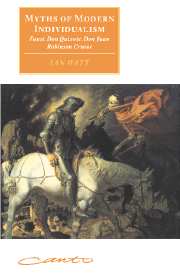Book contents
- Frontmatter
- Contents
- Preface
- Introduction
- Part I THREE RENAISSANCE MYTHS
- 1 From George Faust to Faustbuch
- 2 The Tragicall History of the Life and Death of Doctor Faustus
- 3 Don Quixote of La Mancha
- 4 El Burlador and Don Juan
- 5 Renaissance Individualism and the Counter-Reformation
- Part II FROM PURITAN ETHIC TO ROMANTIC APOTHEOSIS
- Part III CODA: THOUGHTS ON THE TWENTIETH CENTURY
- Appendix The worldwide diffusion of the myths
- Index
4 - El Burlador and Don Juan
Published online by Cambridge University Press: 24 November 2009
- Frontmatter
- Contents
- Preface
- Introduction
- Part I THREE RENAISSANCE MYTHS
- 1 From George Faust to Faustbuch
- 2 The Tragicall History of the Life and Death of Doctor Faustus
- 3 Don Quixote of La Mancha
- 4 El Burlador and Don Juan
- 5 Renaissance Individualism and the Counter-Reformation
- Part II FROM PURITAN ETHIC TO ROMANTIC APOTHEOSIS
- Part III CODA: THOUGHTS ON THE TWENTIETH CENTURY
- Appendix The worldwide diffusion of the myths
- Index
Summary
Like Don Quixote, Don Juan was created complete in a seventeenth-century literary masterpiece from Spain. The play in which he made his debut was, almost certainly, written by a Spanish monk, Fray Gabriel Téllez (1581?–1648), using the professional name of Tirso de Molina. This pseudonym – he had others, including Paracuellos de Cabañas and Gil Berrugo de Texares – combines “thyrsus,” the wand of Dionysus, with molino, a grain mill. Tirso's play about Don Juan is called El Burlador de Sevilla y convidado de piedra (The Trickster of Seville and His Guest of Stone).
There is considerable confusion about the play's date. El Burlador was not published until 1630 (and then only in a collection of twelve plays by various authors), but it clearly existed earlier. The earliest possible date that has been mentioned is 1607; the latest, 1629. The most plausible guess is that the original version of the play was first produced in 1616, when Tirso is known to have been in Seville. In any case, the play certainly belongs to a period about a generation later than the various early printed versions of Faust, and shortly after the publication of Don Quixote.
The 1630 collection of plays attributes El Burlador to Tirso. The play is not among those published in the five collected volumes of Tirso's plays that came out during his lifetime, but this cannot be taken as evidence against Tirso's authorship.
- Type
- Chapter
- Information
- Myths of Modern IndividualismFaust, Don Quixote, Don Juan, Robinson Crusoe, pp. 90 - 119Publisher: Cambridge University PressPrint publication year: 1996



